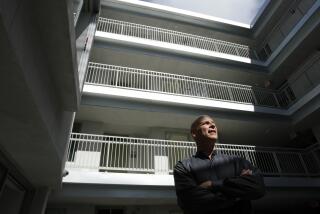KB Home’s Stock Options Under Review
- Share via
Stock options granted to KB Home Chief Executive Bruce Karatz, which helped make him one of the nation’s highest-paid executives, are under scrutiny amid allegations they were improperly dated to maximize their potential value.
KB said Wednesday that it was reviewing certain options awarded to Karatz and other corporate officers after a shareholder lawsuit accused the Westwood-based home builder of backdating option grants to coincide with low points in the company’s share price.
Karatz, the highest-paid executive in the home-building industry, received generous annual bonus and stock option packages tied to the company’s stellar performance during the recent housing boom. In 2005, he earned $156 million, with more than 75% coming from the exercising of options.
More than 100 companies are under investigation by federal prosecutors, government regulators or independent director committees over alleged efforts to inflate the value of stock option grants by timing them with stock price declines.
Options typically are granted as a means of rewarding executives for boosting their company’s performance. Dating options when a stock’s price is particularly low provides a greater possible gain to the grantee.
For KB Home, the stock option controversy comes as the home-building industry contends with a rapidly deteriorating housing market that has started to hinder profit growth and pummel stocks in the sector.
Shares of KB slumped $2.66, or 6.2%, to $40.53 on Wednesday, leading another broad sell-off in builders’ shares after news of disappointing sales of existing U.S. homes.
JPMorgan analyst Michael Rehaut downgraded KB Home’s stock because of the litigation’s potential to divert Karatz’s attention and possibly draw on company cash.
In the lawsuit, filed in Los Angeles County Superior Court this week, KB shareholder Sylvie Davidson alleges that on 16 occasions from January 1995 to October 2005, the company, with certain board members’ approval, improperly dated stock option grants.
“In a striking pattern that could not be the result of chance, each and every one of the foregoing stock option grants was dated just before a substantial rise” in KB Home’s stock price, the lawsuit states. The biggest 10-day rise was 36.3% in October 1999, according to the complaint.
In particular, two grants to Karatz seem to coincide with notable low closing stock prices, according to KB Home filings. On Oct. 25, 1999, the year’s lowest closing price, Karatz received options for 450,000 shares. On Oct. 13, 2000, that month’s lowest closing price, he received 500,000. He has received options on no fewer than 250,000 shares a year since 1998, according to filings.
KB Home said it had begun an internal examination of the grants but declined to offer further details. The review was initially reported by the Wall Street Journal.
“The company has been reviewing these grants with the assistance of outside counsel,” KB Home spokeswoman Caroline Shaw said in a statement. “Because they are the subject of pending litigation, we will not comment on them.”
The lawsuit, which also names the company’s top executives and its directors as defendants, seeks to have the money earned from the options returned to the company. Calls to the plaintiff’s attorney, Daniel Germain of Los Angeles, weren’t returned.
Public attention to the issue of backdated options is a relatively new phenomenon, and has recently led to civil and criminal fraud charges. This month, federal prosecutors charged three former executives of Comverse Technology Inc. in a backdating scheme. One of them remains a fugitive. Two former executives of Brocade Communications Systems Inc. also have been similarly charged.
At the very least, the issue is creating accounting and legal woes for many companies.
“A lot of companies will end up spending a lot of their stockholders’ money,” said Keith Bishop, an Orange County attorney and former state commissioner of corporations. “Companies and shareholders are going to incur a lot of expense and a lot of other collateral costs because this thing’s got legs.”
Karatz, 60, has been with KB Home almost since its founding and is one of its largest individual shareholders, owning about 0.7% of outstanding shares.
He has long been one of California’s highest-paid executives. In 2005, his total compensation, which included stock option grants and other perks in addition to salary and bonuses, ranked him fourth among executives at the state’s 100 largest public companies.
Thanks to the red-hot housing market, he recently joined the elite ranks of best-compensated executives in the U.S. Last year, he placed 20th on Forbes magazine’s list of highest-paid chief executives.
Soaring home prices have meant hefty profits for home builders and their shareholders. KB built 37,000 homes in 2005, a 19% increase from the previous year, to make it the fifth-biggest U.S. home builder.
Karatz’s and other top executives’ compensation is directly tied to his company’s financial performance. KB Home recorded its best year ever in fiscal 2005, booking a 75% increase in annual profit to $842 million on a 34% gain in sales to $9.4 billion. The company’s shares rose 59% during that period.
KB stock surged for six straight years through 2005. But the shares have plunged 44% this year as the once-sizzling real estate market cools down.
More to Read
Inside the business of entertainment
The Wide Shot brings you news, analysis and insights on everything from streaming wars to production — and what it all means for the future.
You may occasionally receive promotional content from the Los Angeles Times.








